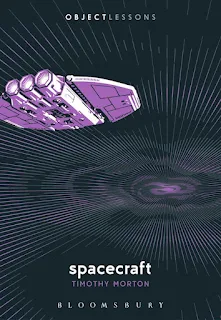* Copy courtesy of Bloomsbury Australia *
Intro
It happens to the best of us.... we pick up a book with the hope of being transported, yet it completely fails to take off. We're coming to the end of my series of Object Lessons reviews thanks to Bloomsbury Australia, and in this installation, guest reviewer Neil Béchervaise shares his reading experience of Spacecraft by Timothy Morton.Neil's Review
For those who have enjoyed the complexities of Edmund Husserl’s early twentieth century Phenomenology and Jacques Derrida’s Deconstruction from a half-century later; for those who delighted in the antics of The Muppets and then in Star Wars, Star Trek, et al, Morton’s near-encounters with spacecraft may be an inimitable intellectual challenge. Those, on the other hand, who entered the pages of Spacecraft expecting to be informed and engaged may be rather disappointed.Morton’s passion for the philosophical underpinnings of space science fiction allows him to wander at warp speed from Han Solo and Chewbacca to Princess Leia, Kermit and Miss Piggy; from a depthy deconstruction of the infinity contained within Dr Who’s most definitely finite TARDIS to the garbage which is the Millennium Falcon.
Considerably more excited by the potential for the space through which spacecraft might travel or, borrowing from Einstein’s relativity theories in which space might travel past the spacecraft, Morton’s exploration manages to introduce the sexual implications of an object being drawn into a largely incomprehensible body. Touching on the nipples of the spacecraft, the gunnery turrets and the control centres, Spacecraft explores political imperatives - fascism, Marxism, imperialism – as he draws on Blake’s Marriage of Heaven and Hell and Beckett’s Endgame to illustrate the philosophical machinations of his apparent heroes, the authors and their on-screen characters.
Timothy Morton’s Spacecraft added little to my understanding of spacecraft as I thought I understood them. Instead, it offered a complex polemic that will be quite familiar to disciples of Derrida, Foucault and Irigaray in which the intension of the author may always present a challenge for the reader.
Spacecraft will probably appeal to those who have sought to make sense of that complexity which is space by studying the film and television depictions of a world from which all boundaries have been removed, all identifiable positions contested and all relativities absorbed into a commercial singularity most easily understood from the viewpoint of a droid, or maybe a muppet.
As Morton observes in his closing fusillade:
“It’s something to think about now that we are literally ‘after the end of the world,’ [because] “America never was a country, never did achieve escape velocity from slavery and property.” Page 111As one reviewer has observed, Timothy Morton’s Spacecraft takes the best part of a whole day to read – but it is not until the end that the political angst is fully revealed. And by that time, the spacecraft has departed – or maybe it has been left behind, garbage, until it is reclaimed for another purpose, perhaps.




































